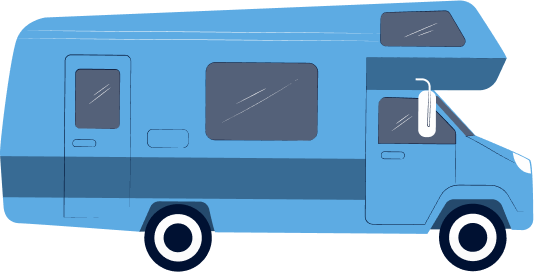Mastering the RV Rental Business: Strategies for Different RVs
When it comes to running an RV rental dealership, knowledge and adaptability are key. RV enthusiasts have a wide range of preferences and needs, and understanding the differences between various types of RVs is crucial to providing excellent customer service.

Let’s take a closer look at what a dealership needs to know and do differently based on the types of RVs they offer for rent.
Class A Motorhomes

At the top of the RV hierarchy, Class A motorhomes are the largest and most luxurious options available. These mammoth vehicles are built on a bus or truck chassis, offering an incredibly spacious interior. They come fully equipped with amenities like full kitchens, bathrooms, bedrooms, and entertainment systems, making them suitable for long-term or full-time RV living.
For dealerships renting out Class A motorhomes, a focus on customer education is important. These RVs are a significant investment, and renters must be well-informed about their operation. Walk-throughs and thorough explanations of the motorhome’s features are essential. Additionally, dealerships can offer packages that include amenities like kitchen utensils, bedding, and entertainment equipment to enhance the overall rental experience.
Class B Motorhomes (Camper Vans)

In contrast to Class A behemoths, Class B motorhomes, or camper vans, are compact and easy to maneuver. Built on a van chassis, they offer basic amenities, such as a small kitchen, sleeping area, and sometimes a small bathroom. These are ideal for individuals or couples looking for a nimble and efficient RV experience.
Dealerships renting out Class B motorhomes should emphasize the simplicity and versatility of these vehicles. They are perfect for adventurers who value freedom and spontaneity. Additionally, providing resources for renting appropriate camping equipment and outdoor gear can enhance the experience for customers who seek adventure beyond the road.
Class C Motorhomes

Class C motorhomes strike a balance between size and maneuverability, often recognized by their cab-over design. Built on a truck chassis, they are typically more affordable than Class A motorhomes while still offering several amenities. These RVs are suitable for families or those seeking a comfortable RV without the bulk of Class A units.
Dealerships should highlight the family-friendly aspects of Class C motorhomes. These vehicles can comfortably accommodate a group, making them ideal for family vacations. Offering flexible rental options, such as daily, weekly, or monthly rates, can cater to various customer needs.
Travel Trailers

Travel trailers come in various sizes and styles, catering to a wide range of preferences and budgets. They require a separate towing vehicle, like a truck or SUV, and offer amenities ranging from basic to luxurious.
For dealerships offering travel trailers, providing guidance on towing equipment compatibility is essential. Many renters may be new to towing, and ensuring they have the right setup for a safe journey is crucial. Offering demonstration sessions on hitching and unhitching can build renters’ confidence.
Fifth-Wheel Trailers

Fifth-wheel trailers are larger towable options that connect to a special hitch in the bed of a pickup truck. They are spacious and feature-rich, often incorporating slide-outs to expand living space when parked.
Dealerships should emphasize the comfort and space these trailers provide. Providing rental packages that include towing equipment and demonstrations on hitching and unhitching can be beneficial for renters.
Toy Haulers:

Toy haulers are designed for outdoor enthusiasts who want to transport recreational vehicles like ATVs or motorcycles. They feature a garage area at the rear for toy storage, with living quarters typically at the front of the trailer.
Dealerships renting out toy haulers should highlight the convenience they offer for adventurers who want both accommodation and a secure way to carry their toys. Providing information on proper toy securing and offering recommendations for exciting off-road destinations can enhance the rental experience.
Final Thoughts
Running an RV rental dealership involves understanding the nuances of each RV type and tailoring your approach to cater to the diverse needs and preferences of your customers. Whether it’s providing educational resources, offering towing equipment packages, or creating themed rental experiences, adapting to the unique features of each RV type can lead to satisfied and repeat customers in the world of RV rentals.
